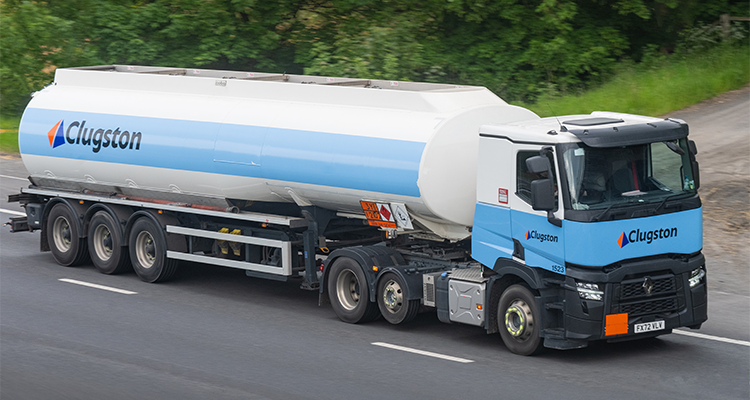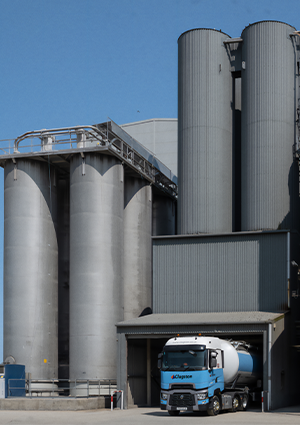
Sustainability is a high priority for the transport industry; here’s how Clugston is playing its part
Over a year ago, Clugston was grappling with driver shortages, a nationwide hike in fuel prices and economic instability. However, in his latest interview with Transportation & Logistics International, Alistair Clugston’s main concern is electrification, and how haulier trucks can be part of the industry’s journey to net zero. “We have been collaborating with two EV consortiums. Innovation Gateway is one organization we’ve been working alongside to look at the costs associated with the infrastructure of electricity. The training required to maintain electric vehicles against combustion engines is significant, and we need to find a way to make that accessible.”
 Owing to the diversification of the company’s haulage fleet, Clugston covers a variety of sectors, which opens greater opportunities for road systems to adapt to electrification transformation. “The costs of new vehicles are exceptionally high, and can be anywhere up to £400,000 for a 42-ton truck. Then you’ve also got the infrastructure charges to think about, which means that getting the technology and support structure onto your site to be able to keep the trucks going is an added expense worth considering,” says Alistair.
Owing to the diversification of the company’s haulage fleet, Clugston covers a variety of sectors, which opens greater opportunities for road systems to adapt to electrification transformation. “The costs of new vehicles are exceptionally high, and can be anywhere up to £400,000 for a 42-ton truck. Then you’ve also got the infrastructure charges to think about, which means that getting the technology and support structure onto your site to be able to keep the trucks going is an added expense worth considering,” says Alistair.
According to him, some of the charging points can be upwards of £200,000 each. These are enormous costs that have to be factored into company rates. However, Alistair is under the impression that as more businesses adopt the electrification infrastructure, the more the prices are likely to decrease. “You’ll see the costs come down significantly, like it was when cellphones first came out. Although mobile phones today are about £1000 apiece, they’ve managed to find a way to make it cost effective, and the manufacturing process for electric vehicles and batteries is similar. We’re also working very closely with Renault, who are pushing to come up with some fantastic ideas for electric innovation, and that work will be a game changer.”
Move to hydrogen
Alistair is also taking a look at hydrogen, which is gaining great interest across the industry. “A huge amount of research is going into making it more available for those that need it most in the sector,” he shares. He continues to be an advocate for hydrogen, as the technology is becoming more useful. Certain companies, like JCB, have already introduced their own prototypes.
Furthermore, the CEO can certainly see hydrogen being used for railway and maritime vessels. Similar to electrification, however, the biggest challenge is cost, and implementing ways to support businesses as they transition, which is why Alistair is waiting to see how the market responds. “The question is absolutely about cost. I’d sit tight and wait to see what the market does because I could quite easily see companies like us having our own hydrogen facility on site in the future.
“It just depends where that fits with the electricity side. I don’t have all the answers and I’m just a bystander really. I’m often invited to loads of meetings each week, and the ideas that are being shared give me a huge amount of hope for the direction we’re heading in, but the journey to get there might be trickier than everyone believes,” he highlights.
When asked what he thinks is needed to make hydrogen fuel more widely used, Alistair’s response is simple: accessibility. The Hydrogen Association UK, a group working with government to encourage hydrogen usage across the country, has a number of consultations with key members of parliament to invest in making this possible. “The organization is discussing at length the associated costs, the installation, and how it can be delivered in a carbon capture environment. Recently, they’ve partnered with the Department of Energy to discuss the net zero targets. “I think we’re about five years ahead of delivering electricity to the road, compared to our European compatriots. We’ll make all the mistakes and reap rewards. It’s going to be a very interesting time.”
Optimistic outlook 
Considering what Alistair needs to juggle, as well as other business leaders like him, the year ahead may seem daunting. However, he maintains a level of optimism as the company investigates new possibilities beyond British borders. “We are constantly looking at the overseas European markets as there is a demand for our services out there. This would mean acquiring new types of equipment, but we are now looking to stabilize more long-term relationships in order to make that happen successfully.
“Previously, the company has relied solely on ad hoc work for customers, which has been great, but considering how unstable our economy is at the moment, it isn’t the most reliable way to grow a business. If I look back at where we were this time last year, we had about 40 percent of our volumes drop in two of our key sectors, which was a massive challenge. And my team and I got together in a timely fashion to discuss how to manage the crisis. But, I must say that having a team of very experienced people who work well together allowed us to get through that tough time and come out the other side stronger, better and more focused. So now we can dip our toes into other ponds and look at greater opportunities.
“Things are going to get better. We were certainly focused on talking ourselves into a recession. I still think energy prices are coming down so the cost of fuel has come down a lot, which will be so helpful. However, on the flip side, prices of other components have gone up, like tires for example, as well as the cost of qualified technicians. It is a tricky time.”
Supporting industry
Alistair is of the opinion that the country is trying to stand on its own feet, and he believes that by supporting the British industry, and utilizing resources better, this will undoubtedly establish a stronger economy. “We hope that we’re not going to be involved in any other conflicts, so for the time being, we’re throwing all our support behind Ukraine. For businesses everywhere, and the wellbeing of citizens of Europe, we really pray it doesn’t escalate any further and comes to an end. Hopefully then, we will start to see things settled down.
“I think this year is going to be a strong one, and I’d like to think it will continue over the next two years. To buttress that, the steel industry is really busy, and if steel is busy, construction is busy, and hundreds of other sectors that support the construction industry are busy as well. Additionally, I hope the mechanisms the government is putting in place will help make things easier for those that really need it. If we can all pull together, this will undoubtedly establish a strong platform for us to push through the next few years,” he concludes.